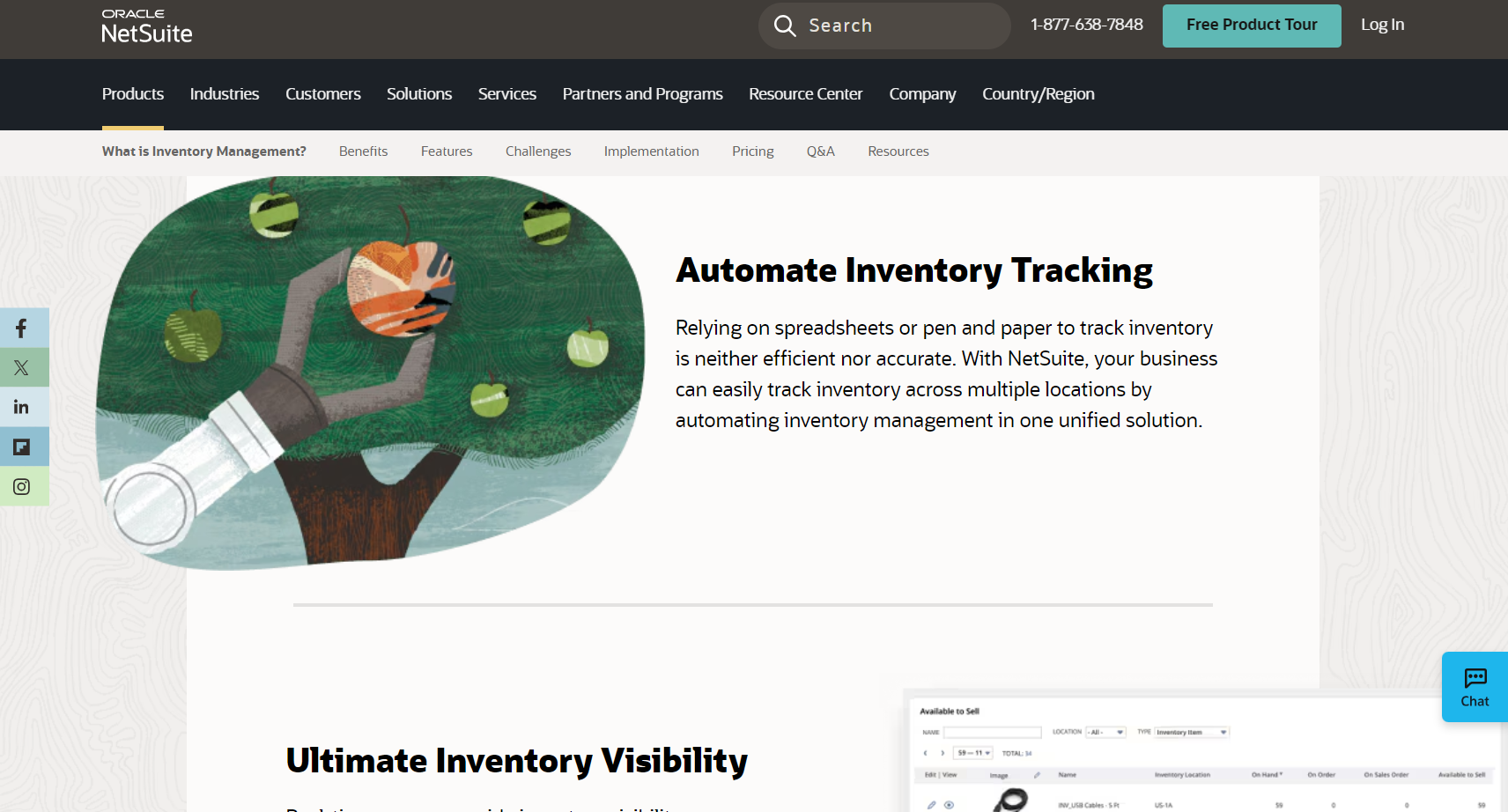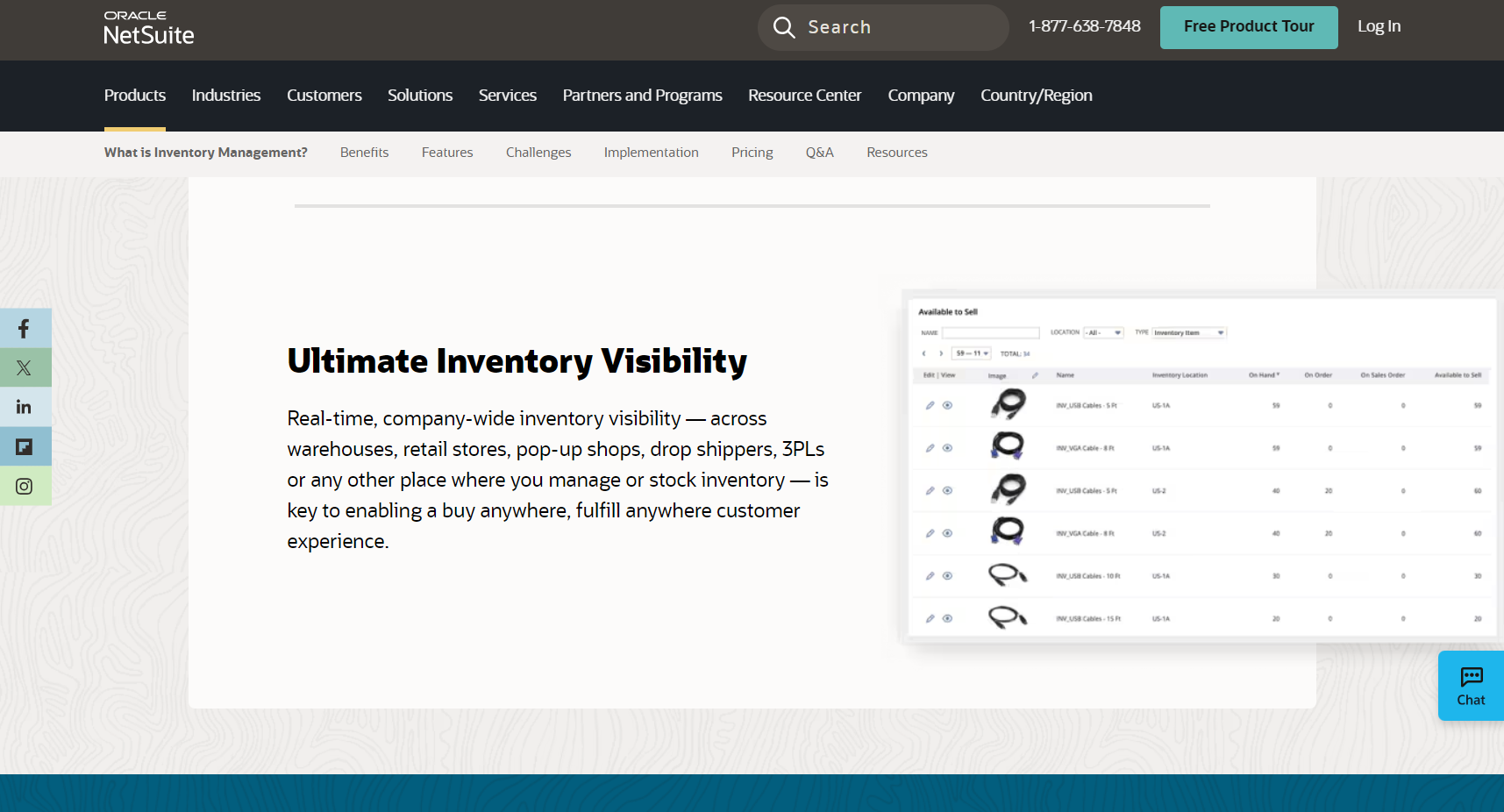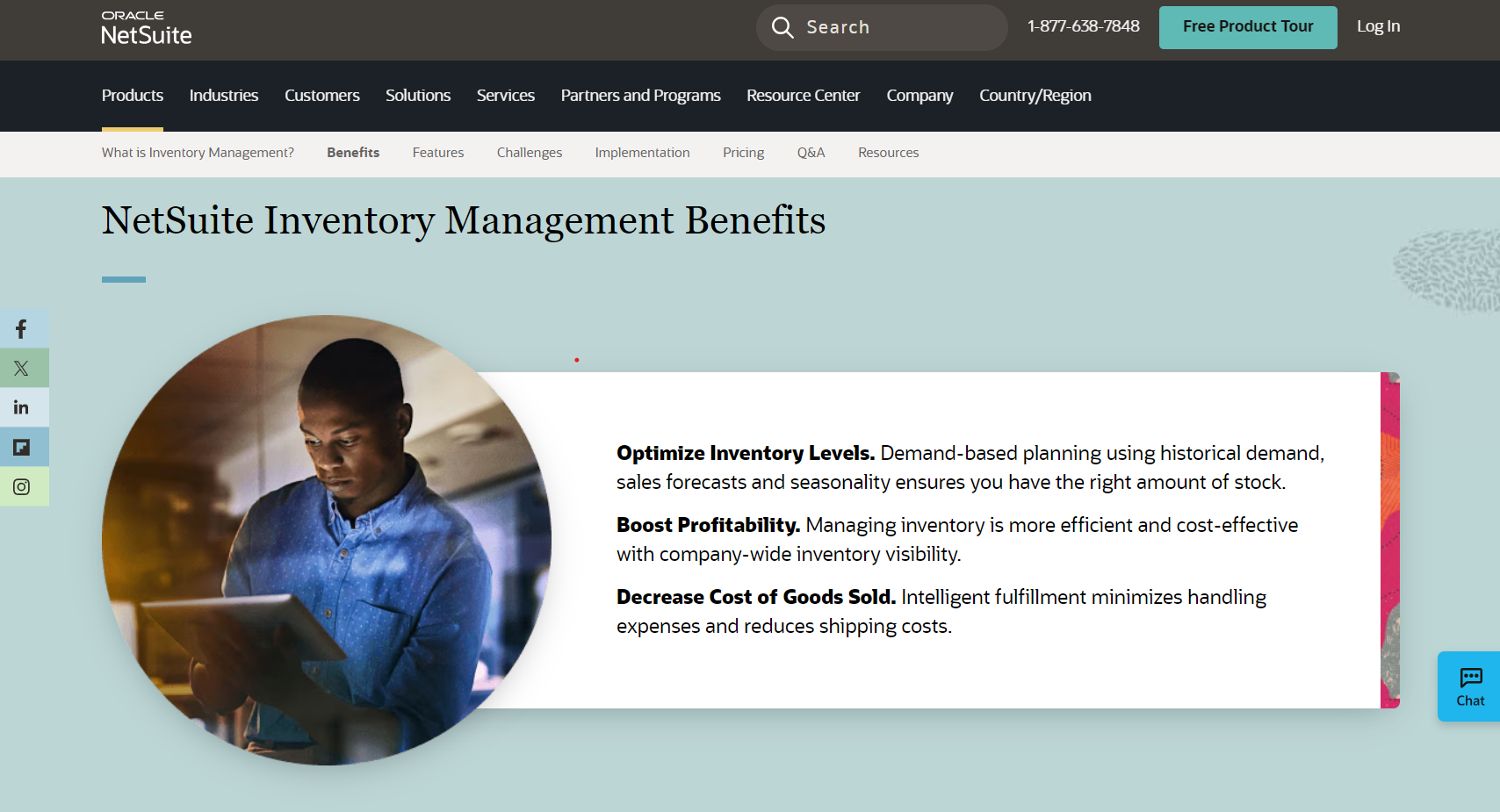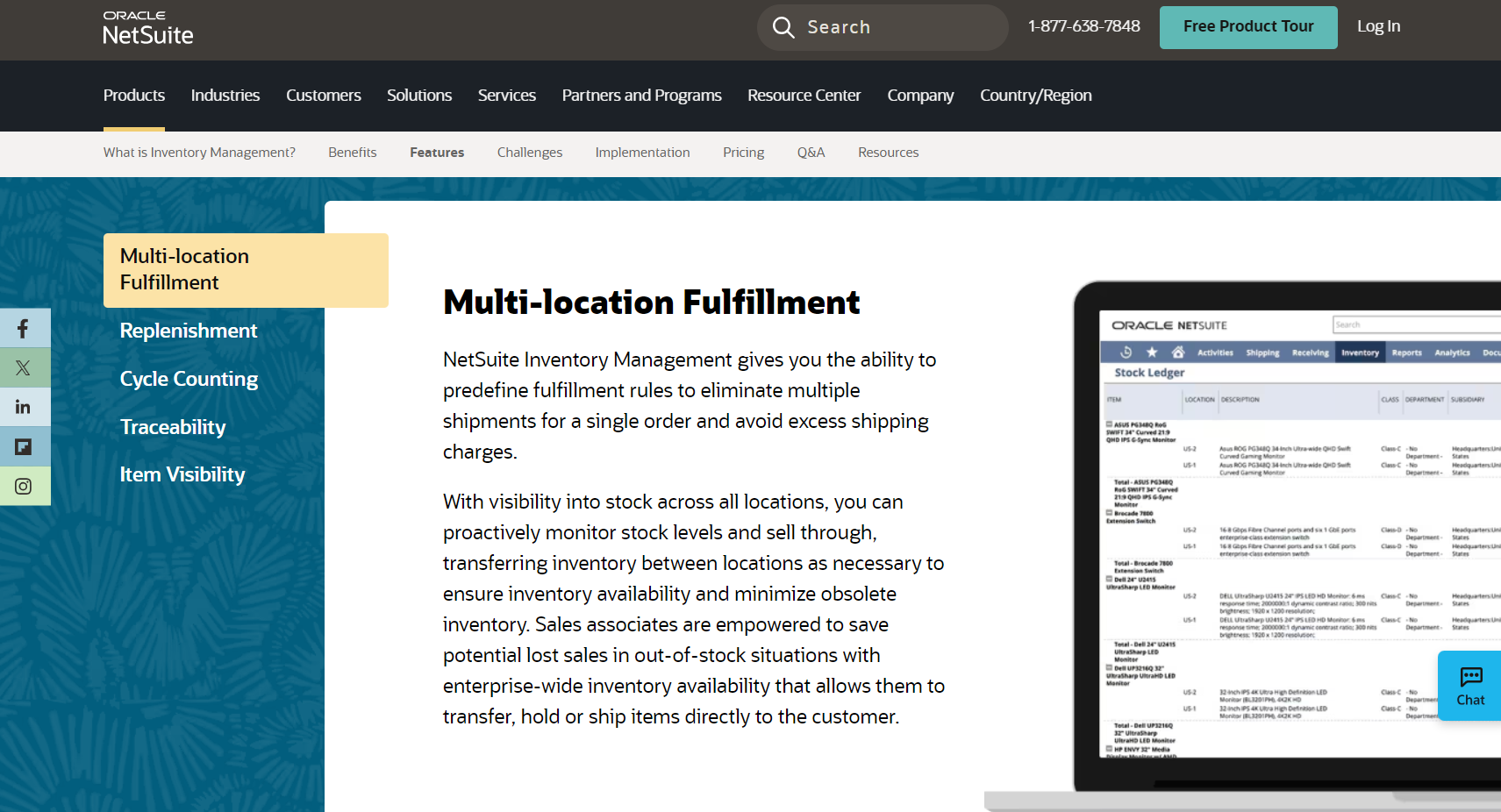NetSuite Inventory Management Software Review: Our Verdict

NetSuite Inventory Management Software is a game-changer for medium to large enterprises, global businesses, and companies with intricate inventory management needs. It shines with its comprehensive features, real-time visibility, and powerful automation capabilities.
NetSuite’s extensive range of features covers everything from order management and demand planning to supply chain management, making it indispensable for businesses with complex operations. The real-time visibility into inventory levels enables informed decision-making, reduces stockouts, and optimizes inventory levels.
Automating routine tasks such as order processing, reordering, and inventory tracking boosts efficiency and minimizes manual errors. Plus, NetSuite’s scalability means it can grow with your business, tailoring the system to evolving requirements.
However, NetSuite isn’t perfect. Its high cost, including licensing, implementation, customization, and ongoing support, can be a hurdle for small businesses and startups. The software’s complexity results in a steep learning curve, requiring comprehensive training to fully harness its capabilities. Additionally, the implementation process can be lengthy and resource-intensive, often needing specialized consultants.
NetSuite Inventory Management Software is an incredibly effective solution for businesses with complex and growing inventory management needs.
Despite its higher cost and complexity, its extensive features, real-time visibility, automation, and scalability make it an invaluable tool for larger enterprises aiming to streamline and optimize their inventory processes. If your business can handle the investment and learning curve, NetSuite offers unmatched power and flexibility to drive your inventory management to new heights.
Pros
- Provides accurate, up-to-date information on inventory levels, locations, and statuses
- Automates reorder points and procurement processes, reducing manual intervention and errors
- Easily accommodates growing business needs, including additional locations, products, and users
- Manages inventory across multiple warehouses, retail locations, and distribution centers from a single platform
- Provides detailed analytics and dashboards to monitor inventory performance, turnover, and other key metrics
Cons
- Can be expensive, which may be a barrier for smaller businesses or startups
- Extensive feature set and customization options can be complex, requiring significant training and adjustment time
- User interface may be overwhelming for some users, particularly those who are not tech-savvy or new to inventory management systems
>>> MORE: Billing Software: How to Choose
1. NetSuite Inventory Management Software Review: Who NetSuite Inventory Management Software Is Best For

NetSuite inventory management software is a good fit for:
- Businesses with complex inventory management needs, including multiple warehouses, diverse product lines, and extensive supply chain operations
- Retailers and e-commerce companies that sell through multiple channels (online, in-store, marketplaces)
- Wholesale distributors with large volumes of orders can optimize their order fulfillment processes, manage bulk shipments, and handle returns efficiently
- Companies looking for a unified platform that integrates inventory management with other business functions (such as financials, CRM, and e-commerce)
- Businesses in highly regulated industries, such as pharmaceuticals or food and beverage
2. NetSuite Inventory Management Software Review: Who NetSuite Inventory Management Software Isn’t Right For
NetSuite inventory management software might not be a good choice for:
- Businesses with straightforward inventory management needs
- Companies with basic inventory requirements, such as single-location retailers or small e-commerce operations
- Businesses that do not need extensive integration with other systems
- Businesses that cannot justify the high costs relative
3. NetSuite Inventory Management Software Review: What NetSuite Inventory Management Software Offers

- ERP (Enterprise Resource Planning)
- Accounting Software
- Global Business Management
- CRM (Customer Relationship Management)
- Human Capital Management (HCM)
- Real-Time Inventory Tracking
- Order Management
- Demand Planning and Forecasting
- Professional Services Automation (PSA)
- Supply Chain Management
- Omnichannel Commerce
- Analytics & Reporting
>>> PRO TIPS: Best Accounting Software for Online Retailers
4. NetSuite Inventory Management Software Review: NetSuite Inventory Management Software Details
- ERP (Enterprise Resource Planning)
NetSuite’s ERP system centralizes various business processes into one platform, providing a unified view of operations. This integration enhances efficiency by streamlining workflows, reducing manual data entry, and improving accuracy across inventory, financials, sales, and supply chain management.
- Accounting Software
NetSuite’s accounting features are closely linked with inventory management, offering automated processes for invoicing, expense management, and financial reporting. This integration ensures accurate financial tracking related to inventory, reduces manual tasks, and minimizes errors, leading to a more efficient financial management system.
- Global Business Management
For international operations, NetSuite supports multiple currencies, languages, and tax regulations, facilitating seamless global transactions. Its global business management features help ensure compliance with local regulations and adapt to various regional requirements, making it suitable for businesses with a worldwide presence.
- CRM (Customer Relationship Management)
The integration of NetSuite’s CRM with inventory management provides a comprehensive view of customer interactions and inventory data. This alignment improves customer service, streamlines sales processes, and ensures that inventory levels are accurately reflected in customer orders, enhancing overall customer satisfaction.
- Human Capital Management (HCM)
NetSuite’s HCM capabilities manage HR functions related to inventory operations, including payroll, benefits, and talent management. This integration helps in efficiently managing the workforce involved in inventory tasks, ensuring proper staffing and resource allocation.
- Real-Time Inventory Tracking
NetSuite offers real-time visibility into inventory levels across multiple locations, including warehouses and retail stores. This capability ensures accurate and up-to-date information about stock levels, reducing the risk of stockouts or excess inventory. Automated updates with each transaction help maintain precise inventory records.
- Order Management
The software automates the entire order lifecycle, from order capture to fulfillment. It handles sales and purchase orders, streamlines order processing, and manages returns. This automation ensures timely and accurate order fulfillment, improving overall operational efficiency.
- Demand Planning and Forecasting
NetSuite’s demand planning tools use historical data and advanced algorithms to forecast future demand. This feature helps businesses anticipate inventory needs, plan for peak periods, and avoid stockouts or overstock situations. Customizable demand plans and supply chain strategies enhance inventory management.
- Professional Services Automation (PSA)
NetSuite’s PSA tools assist in managing projects related to inventory, such as implementing new inventory systems or managing inventory-related tasks. It supports project planning, execution, tracking, and resource allocation, ensuring that projects are completed efficiently and on schedule.
- Supply Chain Management
NetSuite supports comprehensive supply chain management by managing procurement processes, supplier relationships, and vendor performance. It integrates with inventory management to optimize procurement and ensure timely stock replenishment. The software also offers tools for warehouse management, including bin management and mobile barcode scanning.
- Omnichannel Commerce
NetSuite’s omnichannel features unify online and offline sales channels, providing a consistent shopping experience. This integration helps manage inventory across different sales channels, ensuring accurate stock levels and streamlined order fulfillment, which enhances the customer experience.
- Analytics & Reporting
NetSuite provides real-time analytics and reporting tools to monitor inventory performance and business operations. Customizable dashboards and advanced reporting capabilities offer insights into key metrics, trends, and forecasts, supporting data-driven decision-making and strategic planning.
5. NetSuite Inventory Management Software Review: Where NetSuite Inventory Management Software Stands Out

- Comprehensive Integration Capabilities
NetSuite’s ability to integrate seamlessly with other business systems and applications is a major differentiator. It functions as a unified platform that connects inventory management with financials, CRM, e-commerce, and more, providing a cohesive view of business operations. This integration minimizes data silos and ensures consistent, accurate information across all departments.
- Scalability
NetSuite is highly scalable, making it suitable for businesses of various sizes, from small companies to large enterprises. Its infrastructure supports growth by allowing businesses to add new users, locations, and functionalities as they expand. This scalability ensures that businesses don’t outgrow their system as they scale.
- Cloud-Based Delivery
Being a cloud-based solution, NetSuite offers accessibility from anywhere with an internet connection. This eliminates the need for on-premises hardware and maintenance, while also providing real-time data access and updates. Cloud delivery also means businesses benefit from automatic updates and new features without additional effort or cost.
- Global Reach and Multi-Currency Support
NetSuite’s ability to support multiple currencies, languages, and regulatory requirements makes it a strong choice for businesses with global operations. It can manage inventory and financials across different countries, ensuring compliance with local laws and facilitating international business transactions.
- Strong Ecosystem and Community
NetSuite has developed a robust ecosystem that includes a wide range of third-party applications, industry-specific solutions, and a network of certified consultants and partners. This ecosystem enhances NetSuite’s functionality and provides additional resources and support for users.
- Proven Track Record
NetSuite is well-established with a long history of serving a diverse range of industries. Its reputation and experience in the market provide confidence in its reliability and effectiveness. Many large and successful companies use NetSuite, which speaks to its robustness and capability.
- Advanced Analytics and Reporting
NetSuite provides advanced analytics and reporting capabilities that go beyond standard inventory management. Businesses can leverage real-time dashboards, customizable reports, and in-depth data analysis to gain insights into their operations and make informed decisions.
- Dedicated Support and Resources
NetSuite offers extensive support options, including 24/7 customer support, comprehensive online resources, and a vibrant user community. This level of support helps businesses resolve issues quickly and effectively, and access best practices and tips from other users.
6. NetSuite Inventory Management Software Review: Where NetSuite Inventory Management Software Falls Short
- Implementation Complexity
Implementing NetSuite can be complex and time-consuming. The process often involves extensive planning, configuration, and data migration. This complexity can lead to prolonged setup times and a significant investment of resources, including specialized consultants or internal teams.
- Customization Challenges
While NetSuite offers extensive customization options, tailoring the system to fit specific business needs can be challenging. The level of customization required for unique workflows or industry-specific requirements may lead to increased costs and extended implementation timelines.
- Cost Considerations
NetSuite is a high-end solution with a correspondingly high price tag. Beyond the initial licensing fees, businesses may encounter additional costs for implementation, customization, training, and ongoing support. This can be a significant financial commitment, especially for smaller businesses or those with budget constraints.
- Learning Curve
The depth and breadth of NetSuite’s functionality can result in a steep learning curve for users. Training is often necessary to fully understand and utilize the system’s capabilities. This learning curve can affect productivity during the initial adoption phase and may require ongoing training as new features are introduced.
>>> GET SMARTER: Zoho Books Accounting Software Review
7. NetSuite Inventory Management Software Review: Alternatives to NetSuite Inventory Management Software

- SAP Business One
SAP Business One is a comprehensive enterprise resource planning (ERP) solution designed for small to medium-sized businesses. It integrates inventory management with other business functions like sales, procurement, and finance. Its key strengths include robust features for tracking inventory, managing orders, and handling procurement processes. It also offers scalability, meaning it can grow with your business. However, it comes with a higher price tag and a potentially steep learning curve, which might require significant time and resources for implementation and training.
- QuickBooks
QuickBooks is a more cost-effective inventory management solution that integrates well with QuickBooks Online and major e-commerce platforms. It’s known for its user-friendly interface and straightforward features that cater to small and medium-sized businesses. It offers basic inventory tracking, order management, and integration with various sales channels. While it is generally easier to use and more affordable than NetSuite, it might not provide the advanced features or scalability required by larger or more complex businesses.
- Zoho Inventory
Zoho Inventory is a cloud-based inventory management system that provides features such as inventory tracking, order management, and integration with e-commerce platforms. It is known for its affordability and flexibility, with a range of pricing plans including a free tier for smaller businesses. Zoho Inventory integrates seamlessly with other Zoho applications and offers a solid set of features for managing inventory across multiple channels. However, some users may find its advanced features complex and the user experience less sophisticated compared to more high-end solutions.
- Odoo
Odoo is an open-source ERP system that includes a modular inventory management component. It offers extensive customization options and can be tailored to meet specific business needs through its various modules, such as sales, procurement, and accounting. The platform’s open-source nature allows for significant flexibility and adaptability, but it can also result in a complex implementation process. Businesses looking for a highly customizable solution might find Odoo beneficial, though it may require technical expertise for setup and ongoing management.
- Microsoft Dynamics 365
Microsoft Dynamics 365 is a cloud-based ERP solution that provides integrated inventory management, financials, sales, and customer service features. It’s designed to offer a comprehensive suite of tools for managing business operations and is well-suited for businesses of various sizes. The platform integrates seamlessly with other Microsoft products and services, enhancing overall efficiency. However, its cost can be high, and its complexity might lead to a significant learning curve and longer implementation times.
- Sage Intacct
Sage Intacct offers advanced inventory management features combined with financial management and reporting capabilities. It’s a cloud-based solution that provides real-time data access and is designed for growing businesses. Sage Intacct integrates with various third-party applications and services, allowing for comprehensive business management. While it delivers powerful features, it can be relatively expensive, which might be a concern for smaller businesses, and its complexity may necessitate thorough training and support.
8. NetSuite Inventory Management Software Review: Customer Reviews
NetSuite Inventory Management Software is highly rated, with scores of 4.2 on GetApp, 4 on G2, and 4.1 on Capterra. Customers praise its comprehensive features, real-time visibility, and automation capabilities, which streamline and optimize inventory management processes. However, some users note the higher cost and complexity as potential drawbacks, particularly for small businesses and startups. Despite the steep learning curve and significant implementation resources required, NetSuite’s scalability and ability to integrate with other business functions make it a strong choice for larger enterprises with complex inventory needs.
Pro Tips
- Clearly define your inventory management needs and business processes before starting the implementation
- Provide extensive training for your team to help them understand the system’s features and functionalities
- Identify the specific areas where customization will provide the most value and focus on those
- Carefully plan integrations with other systems (e.g., CRM, ERP, e-commerce platforms) to ensure data consistency and seamless operation
- Create custom dashboards and reports to gain insights into inventory performance and other key metrics
- Keep up-to-date with NetSuite’s release notes and updates to understand new features and improvements that could benefit your business
Recap
NetSuite Inventory Management Software is a powerful, scalable solution that offers comprehensive features to streamline and optimize inventory operations. While it may come with a higher cost and complexity, its benefits in terms of real-time visibility, automation, and scalability make it a worthwhile investment for businesses looking to enhance their inventory management processes.













